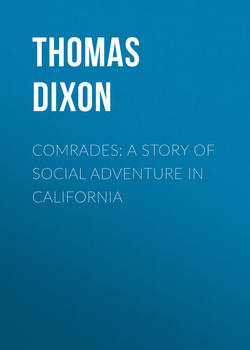Читать книгу Comrades: A Story of Social Adventure in California - Thomas Dixon - Страница 7
CHAPTER VII
FATHER AND SON
ОглавлениеThe Colonel paced the floor of his library with increasing anger as he waited the return of Norman. Never in his life had his whole being been so abandoned to incontrollable rage. He had always been a man of fiery temper, but an iron will had held his temper in control.
His most intimate business associates had always found him suave, persuasive, and genial in every hour of trial. Never once had they heard a threat or an idle boast fall from his lips. He had the rare faculty of beating his enemies in a fight in which no quarter was asked or given, and coming out of it with his bitterest foe turned into a friend. This was one of the secrets of his fortune – an instinctive leadership among powerful men.
For the first time he realized that he had challenged the one man in all his personal acquaintance about whose character he knew nothing – his own son. For the first time he realized that they were strangers. He had been absorbed in the big affairs of life. He had taken the boy for granted. Since the death of his mother twelve years ago, Norman had spent most of his time at school.
The Colonel had always been in command. His word had been law for so many years, it brought him up with a disagreeable start to find that the one man with whom his life was bound, and in whom his hopes centred, could dare thus to defy and flaunt his wishes. It was the most disgusting, enraging fact he had ever encountered. The longer he confronted the situation the more furious and blind his anger became.
Elena had timidly entered the room, and stood watching him gravely before she spoke.
"Has he returned from that woman yet?" the Colonel asked with sudden energy.
"No, and I hope he will stay all day," she answered slowly.
"But he won't," the father snapped.
"I'm sure he will not," the girl sighed. "I don't like you to-day, Guardie."
"You, too, side with these fanatics then?"
"No. I hate them – hate everything they say and do and stand for. I loathe the very sight of them. But you were unfair to Norman."
"Unfair? How?"
"You allowed him the widest liberty to do as he pleased, think as he pleased, associate with whom he pleased, and then all of a sudden you sprang on that platform and insulted him before his invited guests."
"How could I dream that he would commit such an act of insane treason before my very eyes?"
"You make no allowance for the spell of Barbara Bozenta's eloquence. I don't like her, but she's a wonderful little woman, and I envy her her power over men."
"I'll end this folly to-day," was the Colonel's firm announcement.
"I'm not so sure," Elena warned.
"I'll show you!"
She came close and laid her hand on the Colonel's arm.
"Will you promise me one thing, Guardie?" she asked, tenderly.
The anger faded from the strong face, and his voice sank low.
"I'm afraid I've never been able to refuse you anything, child. It's on your account, I think, I'm most angry with Norman to-day."
"You promise?" she repeated.
"Yes, what is it?" he said, bending to kiss her smooth, white forehead.
"Promise to put all anger out of your heart and talk to Norman as a father, not as an enemy – won't you?"
"An enemy?" the Colonel slowly asked.
"Yes. I thought you were going to strike him once. It would have been horrible. I never could have forgiven you for that. You've always been my hero, Guardie – I never saw you give way to anger before. I don't like it. You'll talk to him lovingly and tenderly as a father, won't you?"
"Yes, dear, for your sake, I will," he answered.
"Then I'll tell him to come. I asked him to wait outside until I saw you."
She turned and quickly left the room. In a moment Norman entered and stood facing his father.
The Colonel flushed with anger at sight of the insolence with which the younger man calmly surveyed him.
"Well, sir," the father said, at length, "have you nothing to say to me after what has occurred to-day?"
"I was under the impression that you had something to say to me," was the cool answer.
By an effort of will the older man crushed back an angry retort, smiled, and said:
"Sit down, please – I've a good deal to say to you."
Norman threw himself lazily into a chair, and continued to watch his father with a curious expression of half-amused contempt. The Colonel stood in silence, evidently struggling with his emotions, and feeling for the right word with which to begin.
Norman anticipated him.
"Honestly, now, Governor, just between us, don't you think you were a little bit absurd to-day?"
"Absurd?" his father broke in with rising accent.
"Just a little childish about a piece of red, white, and blue cloth?"
"Perhaps so, my boy," was the answer. "Just about as absurd as you were over the red rag you lifted in its place. Why did you do it?"
